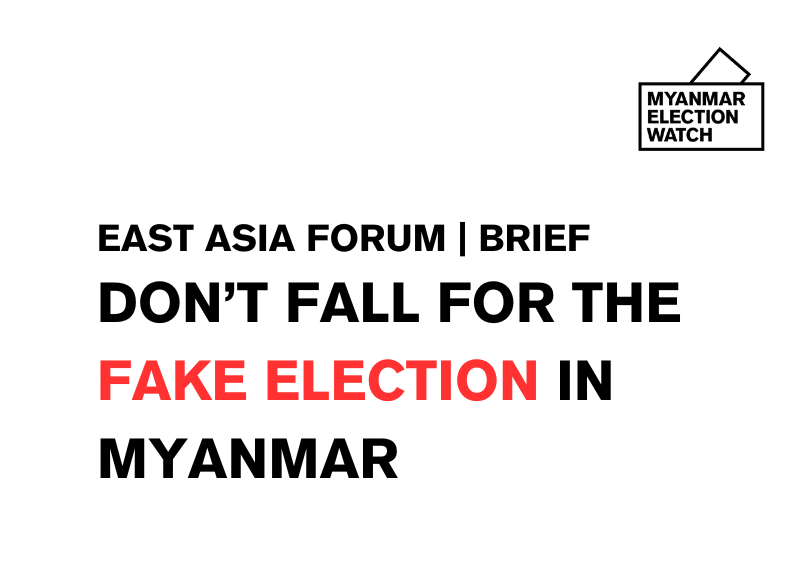Myanmar's military junta plans to hold elections in November 2025, but this is widely seen as a sham. Free and fair elections are impossible due to widespread conflict and repression. The anti-junta movement now seeks fundamental changes in state–society relations, focusing on federalism and ethnic self-determination. Instead of supporting these elections, the international community should back the ongoing 'Spring Revolution' and support local governance in areas controlled by ethnic armed organisations.

By Mi Kun Chan Non (Mon Womens' Organization) and Ashley South (Chiang Mai University)
Link to the original source HERE.
The junta in Myanmar plans to hold elections in November 2025. The international community should not support this farce. The junta cannot carry out credible polls, and the revolutionary movement triggered by the February 2021 coup has moved towards seeking a fundamental restructuring of state–society and civil–military relations.
The State Administration Council (SAC) seized power on 1 February 2021, overturning the National League for Democracy’s landslide victory in the November 2020 elections. Without credible evidence, Senior General Min Aung Hlaing claimed that the 2020 results were fraudulent. It is ironic that the junta is undertaking a census before the planned elections.
This attempt to gain spurious legitimacy would be laughable if not for regional governments’ interest in returning Myanmar to some form of ‘normalcy’. The international community has left ASEAN to lead in addressing the Myanmar crisis, with very little progress made.
While ASEAN member states are under no illusion that the junta can run free and fair elections, they may view fresh polls as an attractive ‘exit ramp’ to resolve the present crisis. But holding elections under the SAC will likely provoke further conflict and violence.
Following the coup, anti-junta forces — long-standing ethnic armed organisations, which have been struggling for autonomy for decades, and newly formed People’s Defence Forces — have overtaken large parts of the country, establishing liberated zones even in previously firmly government-controlled and Burman-populated areas in the lowland Dry Zone. As of September 2024, the SAC regime controls less than half the country. This means that huge numbers of citizens would be denied access to voting or could only do so at considerable risk.
Schoolteachers and other civil servants will likely be coerced into undertaking the census and administering the elections, placing them in danger of severe criticism, or worse, from anti-junta activists. Many activists suspect the census may be designed primarily to identify and flush out the opposition networks. Any SAC-administered election is likely to be boycotted by large numbers of people and key political parties.
Since the coup, the junta has arrested over 27,000 people, with over 20,000 people still in jail. At least 5500 civilians have been killed in attacks by SAC forces, including devastating air strikes on civilian communities. The junta is deeply unpopular. In a free and fair election, it seems highly unlikely that many people would vote for any military-backed party.
Since the 1960s, military-backed parties have rarely gained more than a quarter of the votes in Myanmar’s rare elections. In the three reasonably free and fair polls since the 1962 coup (1990, 2015 and 2020), the National League for Democracy won around 60 per cent of the popular vote and, correspondingly, the great majority of elected seats under the country’s first-past-the-post system. In January 2023, the junta election commission announced a switch to proportional representation as part of a ‘phased election’. This would likely benefit military-backed parties and any ethnic minority parties short-sighted enough to participate in junta-dominated elections.
Just as important as the impossibility of conducting free and fair elections in Myanmar under the SAC, the widespread anti-junta movement has moved on from calls to reinstate the 2020 election results. Over the past three years, this has become a radical and intersectional Spring Revolution, aiming to fundamentally change state–society relations in Myanmar.
Prior to the coup, narratives and debates tended to focus on achieving or consolidating democracy and later negotiating some degree of federalism. With ethnic armed organisations s and other anti-junta forces having overwhelmed the Myanmar Army across large parts of the country, the mood for ethnic self-determination has gathered momentum. Popular demands now focus on the need for genuine federalism as much as reinstating the failed National League for Democracy government. Young activists argue that, only by fundamentally altering political and constitutional structures and political cultures, can decades of state–society, majority–minority and centre–periphery conflict be resolved.
The key challenges in post-coup Myanmar are the struggle for federalism, including recognition of local governance arrangements, and the urgent need to support local administrations and services provided by ethnic armed organisations, emergent state-based bodies (such as the Karenni State Consultative Council) and civil society actors. Only once such arrangements have been consolidated should nationwide elections be considered. In the meantime, the international community can support peacebuilding at the sub-national level by encouraging inclusive governance arrangements in ethnic armed organisations-controlled areas to prepare for a time when elections can meaningfully take place under conditions of federal democracy.
Unless a new federal-democratic political-constitutional framework for Myanmar is agreed upon, elections — especially if administered by the SAC — risk reinstating majoritarian rule at best and legitimising a brutal military regime at worst. Endorsing Min Aung Hlaing’s desperate plan would distract from the country’s real needs. Supporters of democracy in Myanmar should get behind the Spring Revolution, providing aid through civil society organisations and recognising the political legitimacy of ethnic armed organisations and state-based governance bodies.
Mi Kun Chan Non is Director of the Women Empowerment and Community Development Programme of the Mon Women’s Organization, and a member of Alliance for Gender Inclusion in the Peace Process in Myanmar.
Ashley South is Research Fellow at Chiang Mai University.
